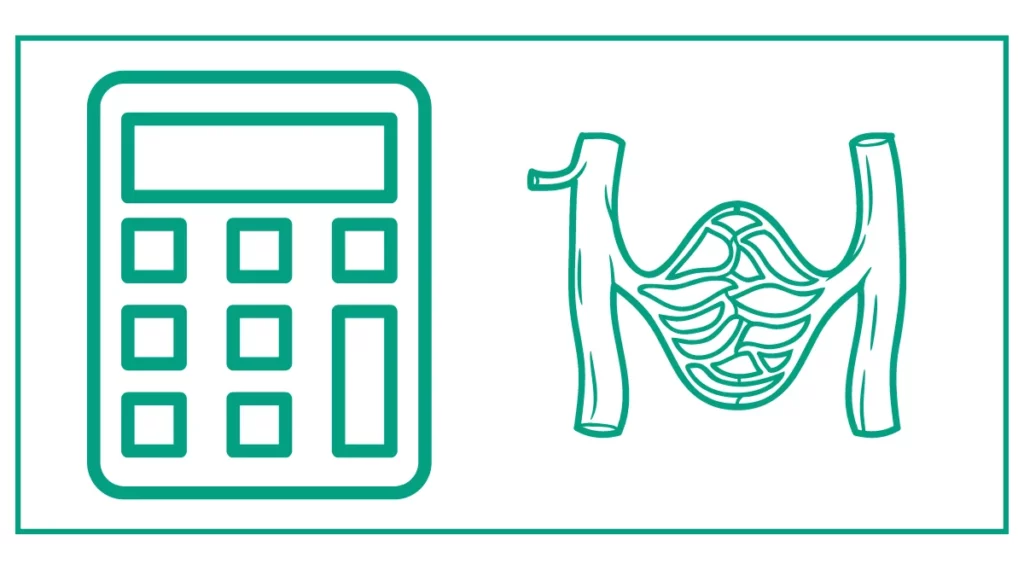Arterial Age Calculator
The arterial calculator helps you calculate the arterial age. It allows you to convert coronary artery calcium (CAC) from Agatston units to age units.
Enter your calcium score and age to find out the approximate age of your arteries.
The arterial ages of the participants correspond to the ages at which their observed CAC score aligns with their predicted CHD risk (based on age). This relationship establishes a meaningful connection between the two variables and provides valuable insights into their cardiovascular health.
The likelihood of calcium in the coronary arteries increases as the arteries age. This version of the CAC score simplifies comprehension. For example, if you are 55 years old, your arteries might resemble those of a person who is 65 years old.

You might also want to determine the results of a 6-minute walk or ALT AST ratio.
Arterial age is a concept that provides insight into the health of your arteries. It’s a measure that compares the condition of your arteries to the average condition of arteries in people of different ages. This concept is crucial because it can indicate whether your arteries are aging faster or slower than expected based on your chronological age. Understanding your arterial age can be a powerful tool in assessing and managing your cardiovascular health.
What is an Arterial Age Calculator?
An arterial age calculator is a tool designed to estimate the age of your arteries based on certain risk factors and measurements. This calculator typically uses information such as your calcium score, which is a measure of calcium deposits in your coronary arteries, along with other cardiovascular risk factors. The result is an estimated arterial age that may differ from your actual age.
The Science Behind Arterial Age
The concept of arterial age is rooted in the study of atherosclerosis, a condition characterized by the buildup of plaque in the arteries. Atherosclerosis is a major contributor to cardiovascular disease and can begin early in life, progressing as we age. The rate of this progression can vary significantly between individuals, which is why arterial age can differ from chronological age.
The Role of Calcium Score in Arterial Age Calculation
One of the key components in calculating arterial age is the calcium score, also known as the coronary artery calcium (CAC) score or Agatston calcium score. This score is determined through a specialized CT scan that measures the amount of calcium in the walls of the coronary arteries. A higher calcium score generally indicates more advanced atherosclerosis and, consequently, an older arterial age.
How to Use an Arterial Age Calculator
Using an arterial age calculator typically involves the following steps:
- Obtain your calcium score through a CT scan prescribed by your doctor.
- Enter your calcium score into the calculator.
- Provide additional information such as your age, gender, and other cardiovascular risk factors if required by the specific calculator.
- The calculator will then estimate your arterial age based on this information.
Interpreting Your Arterial Age Results
When you receive your arterial age result, it’s important to understand what it means:
- If your arterial age is lower than your chronological age, it suggests that your arteries are in better condition than average for someone your age.
- If your arterial age is higher than your chronological age, it indicates that your arteries show signs of aging beyond what’s typical for your age group.
For example, if you’re 45 and your vascular age (another term for arterial age) is calculated to be 55, it suggests that your arteries are showing signs of aging similar to those of an average 55-year-old person.
The Importance of Arterial Age in Cardiovascular Risk Assessment
Arterial age provides a convenient transformation of the calcium score into a measure that’s easily understood by patients and physicians alike. It serves as a valuable tool in cardiovascular risk assessment for several reasons:
- It offers a more intuitive understanding of artery health compared to numerical calcium scores.
- It can motivate individuals to take action if their arterial age is higher than their chronological age.
- It helps in risk communication strategies between healthcare providers and patients.
Factors Influencing Arterial Age
Several factors can influence your arterial age:
- Cholesterol levels: High levels of LDL cholesterol can contribute to plaque buildup in the arteries.
- Blood pressure: Hypertension can damage artery walls, accelerating the aging process.
- Smoking: Tobacco use is a major risk factor for atherosclerosis and increased arterial age.
- Diet: A diet high in saturated fats and low in fruits and vegetables can negatively impact artery health.
- Physical activity: Regular exercise helps maintain healthy arteries.
- Genetics: Family history can play a role in your susceptibility to atherosclerosis.
Comparing Arterial Age to Other Risk Assessment Tools
Arterial age is one of several tools used in cardiovascular risk assessment. Others include:
- Framingham Risk Score: This tool estimates the 10-year risk of developing coronary heart disease.
- Heart Age Calculator: Similar to arterial age, this tool estimates the age of your heart based on various risk factors.
- MESA Risk Score: Developed from the Multi-Ethnic Study of Atherosclerosis, this score incorporates calcium score with traditional risk factors.
Each of these tools provides valuable information, but arterial age is particularly useful due to its direct relationship with measurable arterial changes and its intuitive interpretation.
The Multi-Ethnic Study of Atherosclerosis (MESA) and Arterial Age
The Multi-Ethnic Study of Atherosclerosis (MESA) has been instrumental in developing our understanding of arterial age. This long-term study has provided valuable data on how calcium scores relate to cardiovascular risk across different ethnic groups and age ranges. The MESA data has been used to create more accurate models for estimating arterial age and cardiovascular risk.
Using Arterial Age to Motivate Lifestyle Changes
One of the most significant benefits of the arterial age concept is its potential to motivate lifestyle changes. When individuals learn that their arteries are “older” than their chronological age, it can serve as a wake-up call to adopt healthier habits. These might include:
- Improving diet by reducing saturated fats and increasing fruits and vegetables
- Increasing physical activity
- Quitting smoking
- Managing stress
- Controlling blood pressure and cholesterol through medication if necessary
Limitations of Arterial Age Calculators
While arterial age calculators are useful tools, they do have some limitations:
- They rely heavily on the calcium score, which may not capture all aspects of cardiovascular health.
- They may not be as accurate for younger individuals or those with very low calcium scores.
- They don’t account for all potential risk factors or protective factors.
It’s important to remember that arterial age is an estimate and should be considered alongside other risk factors and in consultation with a healthcare provider.
Future Directions in Arterial Age Research
Research in the field of arterial age continues to evolve. Future directions may include:
- Incorporating more sophisticated imaging techniques to assess arterial health
- Developing more personalized risk assessment models
- Investigating how interventions affect arterial age over time
- Exploring the relationship between arterial age and other age-related conditions
Conclusion
Understanding your arterial age can provide valuable insights into your cardiovascular health. It offers a tangible measure that can help motivate lifestyle changes and guide preventive strategies. While it’s not a perfect measure, when used in conjunction with other risk assessment tools and under the guidance of a healthcare provider, it can be a powerful ally in maintaining heart health.
Remember, regardless of your calculated arterial age, it’s never too late to make positive changes for your cardiovascular health. Regular exercise, a healthy diet, not smoking, and managing stress can all contribute to healthier arteries at any age.
By using tools like the arterial age calculator, we can take proactive steps towards better heart health, potentially reducing our risk of cardiovascular disease and improving our overall quality of life. Always consult with your healthcare provider for personalized advice and recommendations based on your individual health profile and risk factors.
References
- Grundy, S. M. (1999). Age as a risk factor: you are as old as your arteries. The American journal of cardiology, 83(10), 1455-7.
- Kang, J. J., & Bodary, P. F. (2014). How old are your arteries? Exercise-mediated protection from age-associated vascular stiffness. Journal of the American Heart Association, 3(2), e000941. doi.org/10.1161/JAHA.114.000941
- Thijssen, D. H., Carter, S. E., & Green, D. J. (2016). Arterial structure and function in vascular ageing: are you as old as your arteries?. The Journal of physiology, 594(8), 2275–2284. doi.org/10.1113/JP270597
- McClelland, R. L., Nasir, K., Budoff, M., Blumenthal, R. S., & Kronmal, R. A. (2009). Arterial age as a function of coronary artery calcium (from the Multi-Ethnic Study of Atherosclerosis [MESA]). The American journal of cardiology, 103(1), 59–63. doi.org/10.1016/j.amjcard.2008.08.031





